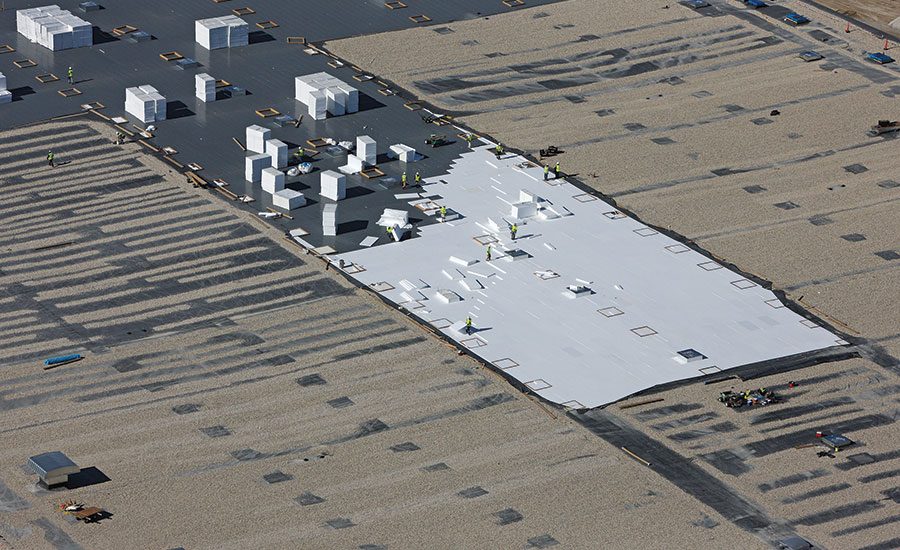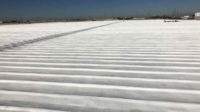In business there is no substitute for efficiency. In large businesses efficiency is an earned commodity. For Uline, North America’s largest distributor of shipping and industrial packaging materials, efficiency is the result of carefully considered, tested, and refined operations involving a complex web of interconnected people, parts, and processes.
Established in 1980, and still a family-owned business today, Uline has grown to more than 4,000 employees throughout the United States, Canada and Mexico supplying more than 31,000 packaging, cleaning, industrial, and general use materials.
“We guarantee next-day delivery and we guarantee everything is in stock,” said Randy Copenharve, Uline’s director of facilities and construction. “We have 28 facilities across the U.S. and we want all of them operating as part of a well-oiled machine. Operational excellence is how we do business, from the way we start our day to how we make decisions on the design and construction of our buildings.”
With more than 22 years in the field and 11 years with Uline, Copenharve recently oversaw construction of a new 1 million square-foot distribution center at Uline’s Wisconsin headquarters. Completed last January, the facility known as W2 is a state-of-the-art distribution center that Copenharve believes is the best organized of all of Uline’s facilities. Since building on past experience is key to efficiency in so many ways, W2 is largely a duplicate of its predecessor W1, including many important design and construction material decisions.
One key decision on such a large, open floor plan facility was thermal insulation to guard against Wisconsin’s dramatic annual temperature swings. With summer temperatures reaching into the 90’s and as low as minus 40 in the winter, cost-effectively maintaining Uline’s desired working conditions in such a large building relies on premium quality insulation.
“ACH Foam Technologies is one of our customers and we investigated their rigid foam insulation for durability, first-term vs long-term costs, and lifetime R-Value,” Copenharve explained. “We wanted materials that could be installed correctly once and not have to revisit the roof for a long time.” Copenharve notes that ACH Foam Technologies’ Foam-Control PLUS+® and Foam-Control® roof insulation provides a fully warrantied R-value that maintains its effectiveness for 50 years. While other types of insulations may claim higher initial R-values for their products, third-party testing has shown that off-gassing occurs over time and reduces the products’ effectiveness. Specifically, polyisocyanurate manufacturers who utilize long-term thermal resistance (LTTR), a weighted average R-value of their product designated over a period of time.
In 2010, Mark Graham, the National Roofing Contractors Association’s (NRCA) vice president of technical services, confirmed that relying on LTTR values for long-term performance may be misleading to designers. “Although the LTTR method of R-value determination and reporting may be appropriate for laboratory analysis, research comparison and procurement purposes, NRCA does not consider LTTR use to be appropriate for roof system design purposes when actual in-service R-value can be an important aspect of roof system performance.” Expanded polystyrene (EPS) foam insulation, on the other hand, doesn’t suffer from off-gassing and therefore retains the originally specified R-values over the entire life of the product, without change.
With high performance expectations established on the W1 project, the task of installing more than 1 million square feet of roofing on W2 fell to SRS Roofing and Sheet Metal of Waterford, Wis.
“SRS is proud to have installed more than 1 million square feet of roofing and received a ‘Perfect’ inspection score from the Carlisle roof inspectors,” said Tom Bechtel, a commercial estimator at SRS. Founded in 2005, the prospect of taking on the largest job in firm history in a low-bid environment caused some trepidation for SRS. “You have to streamline crew efficiency to achieve the required production rates, while at the same time making certain that the quality is maintained,” Bechtel continued. “Completing an installation of this size, on schedule, while keeping the quality high enough to earn a perfect inspection score is impressive.”
For the SRS team, streamlining efficiency came down to a matter of logistics. Working closely with general contractor, Mortenson Construction, and other trades to carefully calculate the volume of materials that would be ready at a given time was critical to the project since the building’s envelope was constructed of tilt-up wall panels.
“Logistics played a big role on this project in several ways,” Bechtel said. Determining the right amount of insulation to keep crews moving as quickly as possible was a challenge because there wasn’t room to have a large volume of material stored on site. Fortunately for SRS, they already had an existing relationship with ACH Foam Technologies on previous projects and were able to coordinate a steady flow of insulation to the site with a just-in-time delivery process. To maintain a steady flow of materials, ACH Foam supplied insulation to the Uline jobsite from two of their eight manufacturing locations in Fond du Lac, Wis. and Washington, Iowa.
As the roofing system was put in place section by section, the SRS team also had to account for a significant volume of traffic moving across the new surface to reach the other areas still under construction. With 940 skylights installed on the roof, extensive mechanical and electrical equipment, and many other building trades requiring roof access during construction, SRS had to ensure that the newly installed sections were not damaged.
“It was important to avoid even the smallest penetration in the finished roof,” Bechtel added. “We developed an honor system with subcontractors. If anyone reported damage to the roof, we repaired it immediately for free. If unreported damage was discovered the costs for the repairs fell to the responsible party.”
Uline’s new W2 distribution facility is now fully operational. When it came to building the company’s largest roof to-date, success for both Uline and SRS Roofing and Sheet Metal was the result of careful planning and efficient execution.






Report Abusive Comment